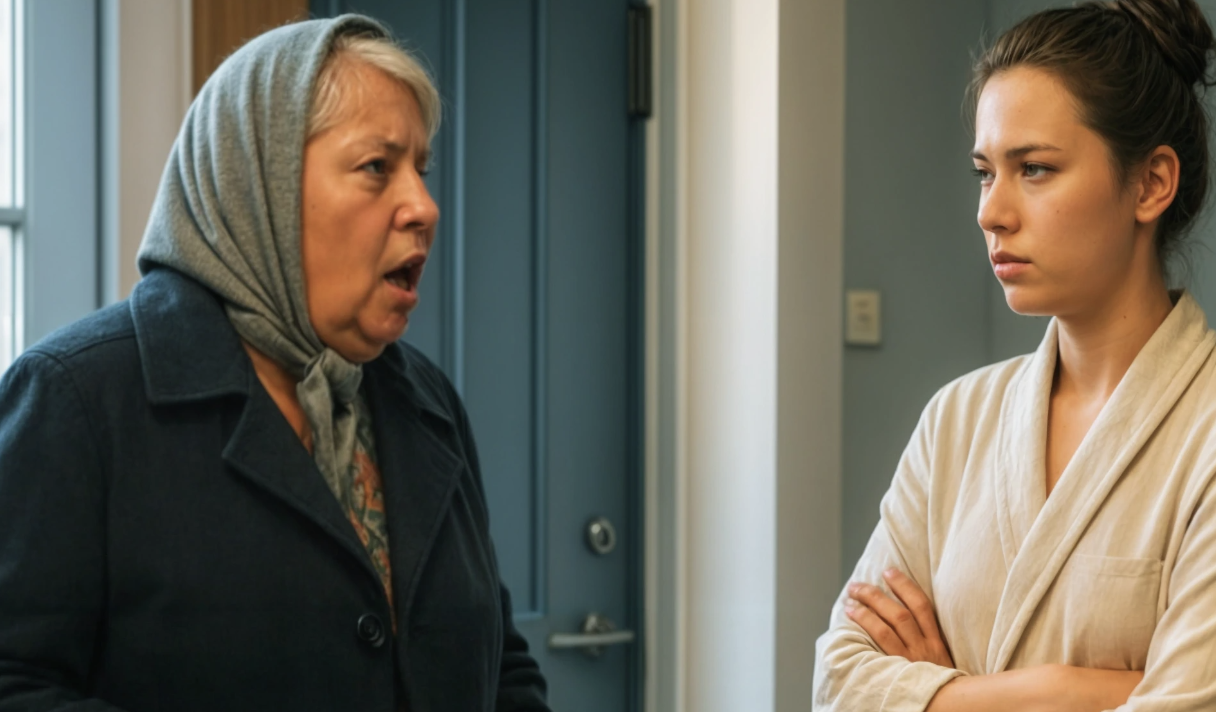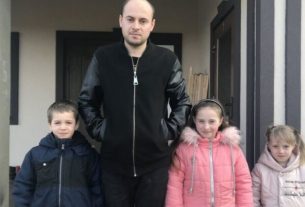Olga left the office for the last time, holding a small box with her personal belongings. The October wind tugged at her hair, and her heart felt astonishingly light. No regrets, no doubts. Only relief.
Seven years of work at that company were behind her. Seven years during which every paycheck disappeared to the usual addresses before Olga even had time to think about herself. Her mother-in-law, Valentina Sergeyevna, her husband’s sister Lena, the nephews, utilities, groceries, medicine, school supplies. The list never ended.
It all began gradually. When Olga married Pavel, her mother-in-law immediately made it clear that a daughter-in-law had to be useful. Not in words, of course. Valentina Sergeyevna knew how to speak so that refusing was impossible.
“Olenka, my utility bill just came. My pension isn’t enough at all. Could you help? I’ll pay you back later, I promise.”
“Later” never came. But the requests became more frequent.
“Olenka, Lena’s kids are getting ready for school. You know how expensive everything is now. Maybe you could transfer a little?”
“Olenka, the doctor prescribed me medicine. So expensive. Help me, dear.”
At first, Olga thought she was helping the family. That this was how it should be. Every time her mother-in-law called, Pavel would nod and say:
“Just help Mom. She’s alone.”
Alone. Valentina Sergeyevna was not alone. She had a daughter, Lena, who worked as a salesclerk in a store, but for some reason never helped her mother. Apparently, she considered it the daughter-in-law’s duty.
Olga transferred money. Paid the bills. Bought groceries and brought them to her mother-in-law. Sometimes she stayed for a while at Valentina Sergeyevna’s, listening to endless stories about the neighbors, her health, and how hard it was to live on one pension.
“Maria Ivanovna’s son visits every week and brings gifts. And my Pavel has forgotten his mother completely.”
Olga kept quiet. Pavel hadn’t forgotten. He just knew his wife would solve every problem.
Over time, the demands grew. Valentina Sergeyevna even stopped saying thank you. The money was taken for granted. As if Olga were obliged to hand it over. As if it wasn’t her salary but a family budget that everyone had the right to dip into.
Lena got used to it, too. She called once a month, always with the same request:
“Olya, transfer something for the kids. They need shoes. Or jackets. Or for their clubs.”
Lena’s children were healthy, well-fed, and had the latest smartphones. But somehow there was never enough money.
Olga sent it. Because refusing meant hearing from Pavel:
“What does it cost you? They’re kids.”
Kids. Other people’s kids, whom Olga saw a couple of times a year. But saying no was impossible.
Three years ago, Pavel lost his job. He said it was temporary, that he’d find something better soon. “Temporary” dragged on. Pavel looked for work, but half-heartedly. He turned down openings where the salary seemed too small. He was waiting for something suitable.
And while he waited, all the expenses fell on Olga’s shoulders. Not only their own, but also Pavel’s relatives’. Valentina Sergeyevna didn’t ask less. On the contrary.
“Olenka, you understand, it’s hard for Pavel right now. I don’t want to upset him. You’ll help, won’t you?”
Olga helped. Because she was tired of arguing. Tired of explaining that there wasn’t enough money. Tired of hearing that relatives were more important than anything.
Pavel stayed out of these arguments. He sat at the computer, searching for jobs or playing games. When Olga tried to say it was impossible to carry everyone alone, her husband waved her off:
“You’re exaggerating. Mom asks for a little. Lena’s struggling too.”
A little. Olga once did the math. In a year, almost a third of her salary went to Pavel’s relatives. A third. And there was the mortgage, food, clothes, gas. Almost nothing was left for herself.
When Olga bought a new coat, Valentina Sergeyevna looked at it and said:
“Expensive, I’m sure. And I can’t afford my medicine.”
Olga clenched her fists. She kept quiet. The coat wasn’t expensive, but she didn’t want to explain that to her mother-in-law.
In the summer, Lena asked for money for the children’s vacation. She said they were tired and needed the sea.
“Olya, help out, please. I’ll pay you back later.”
Olga transferred the money. Lena didn’t pay it back. But she did show photos from the beach where the kids ate ice cream and rode banana boats.
Olga stayed home. She spent her vacation at a friend’s dacha because there was no money for the sea.
Pavel said:
“So what? We’re fine here.”
Fine. Olga was not fine.
In September, Valentina Sergeyevna asked her to pay for a bathroom renovation. She said the pipes were completely rotten and that she’d flood the neighbors if they weren’t repaired.
Olga paid. Then she learned that her mother-in-law had ordered not only new pipes but also new tile and a more expensive faucet. Because if you’re doing it, do it right.
When Olga asked why the extra expense, her mother-in-law took offense:
“I thought you wouldn’t begrudge it for me. I’m not a stranger.”
Not a stranger. But not family to Olga, either. Valentina Sergeyevna never asked how Olga was. Never asked if she was tired, if she needed help. She only asked. Demanded. Believed she had the right.
Olga was exhausted.
Exhausted from waking up thinking about who needed money transferred today. Exhausted from counting every penny. Exhausted from the reproaches whenever she refused.
And exhausted from Pavel. From the fact that her husband didn’t see the problem. Didn’t want to see it. It was convenient for him that his wife handled everything. That his mother was satisfied, his sister didn’t complain, and the nephews were clothed and fed.
Olga thought it over for several months. Weighed it all. Tried to find a compromise. But compromise doesn’t work when the other side refuses to meet you halfway.
So Olga made a decision.
First, she wrote a resignation letter. Her boss was surprised, tried to dissuade her, offered her a vacation. But Olga was adamant. She needed to stop. To rest. To figure out what came next.
Second, she opened her banking app and canceled all auto-payments. The utilities for Valentina Sergeyevna, transfers to Lena, the subscriptions to various nonsense Pavel had asked for.
Olga didn’t explain anything. She simply stopped the money.
The first week was quiet. Apparently no one noticed. Or they noticed and decided it was a mistake.
On the eighth day, Valentina Sergeyevna called.
“Olenka, you forgot to pay the utilities. I received the bill.”
“I won’t be paying them anymore, Valentina Sergeyevna.”
A pause.
“What do you mean, you won’t? You’ve always paid.”
“‘Always’ doesn’t mean ‘forever.’”
“But why? What happened?”
“I quit my job. There’s no money.”
“You quit? Why?”
“Because I needed to.”
“But what about me? I have nothing to pay with!”
“You have your pension, Valentina Sergeyevna. And a daughter.”
“My pension is small! And Lena can barely make ends meet herself!”
“I’m sorry. But I can’t anymore.”
Valentina Sergeyevna hung up. Olga exhaled.
The next day, Lena called.
“Olya, what’s going on? Mom’s crying. She says you refused to help.”
“I quit. I can’t help.”
“You quit? What are you two going to live on?”
“That’s my problem, Lena.”
“But you know Mom has no money! How will she manage?”
“I don’t know. Maybe you can help?”
“I have kids! I need help too!”
“Then find another sponsor.”
Olga ended the call. Her hands were shaking, but she was smiling. For the first time in many years, she felt light.
Pavel found out in the evening. He returned from yet another job interview he never made it to because he’d gotten stuck in traffic.
“Mom called,” he said. “Says you refused her.”
“Yes.”
“Why?”
“Because I’m tired.”
“Tired of what? You were just transferring money.”
“Just? Pavel, I’ve supported your relatives for seven years. I paid their bills, bought groceries, clothes, medicine. Seven years. And you didn’t even notice.”
“Well, I thought it wasn’t hard for you.”
“Not hard? I barely had enough for us. And you’ve been out of work for three years. And still your mother asked, your sister asked. And you kept quiet.”
“They’re family.”
“I’m family too. But somehow I was the only one carrying everyone.”
Pavel frowned. He clearly hadn’t expected such a conversation.
“You could have said something if it was hard.”
“I did. You didn’t listen.”
“Okay, fine, I get it. You’ll rest and everything will work out.”
“I quit my job, Pavel.”
Her husband froze.
“What?”
“I quit.”
“Why?!”
“Because I needed to.”
“But what are we going to live on?”
“I have savings. Enough for a couple of months. After that, we’ll see.”
“We’ll see? Are you out of your mind? Who’s going to pay the mortgage?”
“I will. While there’s money. And then you’ll find a job. Or I will. But your relatives are not getting another kopeck.”
“You can’t just abandon my mother like that!”
“I can. And I have.”
Pavel wanted to say something, but Olga went to the bedroom and closed the door. She didn’t want to talk anymore.
The morning began with the doorbell. Long, insistent. Then again. And again.
Olga opened her eyes. Pavel woke up too but didn’t move. He lay there staring at the ceiling.
The bell wouldn’t stop.
“Pavel, answer the door,” Olga muttered.
Her husband was silent.
“Pavel!”
“It’s Mom,” he said quietly. “Probably.”
“So?”
“You open it.”
Olga got up. Threw on a robe and went to the hallway. She looked through the peephole. On the landing stood Valentina Sergeyevna, wearing a coat tossed over her nightgown. Her face was red, her gaze resolute.
Olga opened the door.
Valentina Sergeyevna burst into the apartment without even saying hello.
“What do you think you’re doing?!” the mother-in-law shouted. “How dare you abandon your family in their time of need?!”
Olga quietly closed the door. She stood and looked at her.
“Do you hear me?! I’m talking to you!” Valentina Sergeyevna stepped closer, jabbing a finger in the air in front of Olga’s face. “You’re disgracing the whole family! How can you behave like this?!”
“Valentina Sergeyevna, it’s six in the morning,” Olga said calmly. “You’ve woken the neighbors.”
“I don’t care about the neighbors! Do you think it’s easy for me to come here at this hour?! But you left me no choice!”
“No one asked you to come.”
“What do you mean, no one asked?! You turned off your phone! You don’t answer calls! Do you think you can just stop helping a mother like that?!”
“You’re not my mother.”
Valentina Sergeyevna froze. Her eyes widened.
“What did you say?!”
“I said you are not my mother. You’re Pavel’s mother. He’s the one who should help you.”
“Pavel has no job! You know that!”
“I know. I’ve known for three years. And for three years I’ve carried everyone by myself.”
“That’s how it should be! You’re the daughter-in-law! You’re obliged to help the family!”
“I’m not obliged to anyone.”
Valentina Sergeyevna gasped with indignation. Her face turned crimson.
“Ungrateful! We accepted you into our family! As one of our own! And you—!”
“As one of your own?” Olga smirked. “One of your own who’s supposed to pay for everyone?”
“You earn money! That means you must share!”
“I don’t earn anymore. I quit.”
“Why?! To punish me?!”
“To live for myself.”
Her mother-in-law flailed her hands.
“That’s selfish! Pure selfishness! Aren’t you ashamed?!”
“I’m not.”
“I have nothing to pay for my apartment with! Do you understand?! Nothing!”
“I understand. But it’s not my problem.”
“How is it not your problem?! You’re the daughter-in-law!”
“A daughter-in-law isn’t an ATM.”
The mother-in-law jerked as if she’d been slapped. She was silent for a moment, then spoke more quietly, though her voice trembled with anger:
“Pavel! Pavel, get out here!”
Silence. Her son didn’t come out.
“Pavel! I know you can hear me! Come out at once!”
The bedroom door cracked open. Pavel came out but didn’t come closer. He stood at the threshold, staring at the floor.
“Tell your wife to stop this circus!” demanded Valentina Sergeyevna.
Pavel was silent.
“Pavel! Do you hear me?!”
“I hear you, Mom.”
“Well?!”
“I don’t know what to say.”
“What do you mean you don’t know?! Are you the man of the house or not?!”
Pavel raised his eyes. He looked at his mother, then at Olga.
“Mom, not now. It’s too early.”
“Too early?! When then?! When they evict me from my apartment?!”
“No one’s going to evict you.”
“They will! If I don’t pay the utilities! And I have no money! My pension is small!”
“Mom, ask Lena to help.”
“Lena can barely make ends meet herself!”
“Then cut back.”
His mother exploded.
“Cut back?! I can’t afford my medicine and you tell me to cut back?!”
“Mom, I’m unemployed. I can’t help.”
“Then let your wife help!”
“She quit.”
“Let her get a new job!”
Pavel spread his hands.
“Mom, that’s her decision.”
“Her decision?!” Valentina Sergeyevna turned to Olga. “So you’re making decisions for the whole family?!”
“For myself,” Olga replied evenly. “Only for myself.”
“You shameless, heartless woman! I knew you were like this! I knew it from the very start!”
“Then why were you quiet for seven years?”
“Because I hoped you’d improve! That you’d become a normal person!”
“A normal person is someone who gives you money?”
“A normal person helps their elders!”
Olga walked to the door and flung it wide open.
“Please leave, Valentina Sergeyevna.”
Her mother-in-law froze.
“What?”
“Leave. The conversation is over.”
“You’re throwing me out?!”
“I’m asking you to leave my apartment.”
“Yours?! This apartment was bought during the marriage! That means it’s joint property! My son’s, too!”
“Please leave.”
“I won’t go until you promise to help!”
“Then you’ll stand in the doorway. I don’t care.”
Valentina Sergeyevna looked at her son.
“Pavel! Are you going to let her talk to me like that?!”
Pavel stood silently. He didn’t move. Didn’t speak. He stared off to the side.
“Pavel!”
Her husband sighed.
“Mom, let’s go. We’ll talk later.”
“How can I go?! Without solving the problem?!”
“Mom, please.”
She stood there, red-faced, disheveled, her hands trembling with rage. Then she spun around and left. On the threshold she turned back:
“Mark my words, Olga! You’ll regret this! It’ll all come back to you!”
Olga quietly closed the door. Turned the key. Leaned her back against the door and exhaled.
Pavel was still standing by the bedroom.
“Why did you treat her like that?” he asked softly.
“Like what?”
“Rudely.”
“Rudely?” Olga raised her eyebrows. “Pavel, your mother burst into our apartment at six in the morning and started yelling. Isn’t that rude?”
“Well, she was upset.”
“So what? I’m supposed to disregard myself just so she doesn’t get upset?”
“No, but you could have handled it differently.”
“How differently?”
“Well, explained. Said you can’t help for a while.”
“I can’t help ‘for a while.’ I won’t help at all.”
Pavel was silent.
“She’s my mother.”
“I know.”
“I feel sorry for her.”
“I don’t.”
“Olga, how can you be like that?”
“I can. After seven years of being treated like a cash source.”
“No one used you.”
“Seriously? Then what was that?”
“Well, you were helping. Voluntarily.”
“Voluntarily? Pavel, every time I tried to refuse, you asked me to help. Every time.”
“Because Mom really did have it hard.”
“And I didn’t?”
Pavel didn’t answer.
“I worked. Alone. For three years—alone. I paid for the apartment, the food—everything. And I supported your relatives. And you didn’t even notice.”
“I noticed.”
“No. You pretended not to. Because it was convenient for you.”
“Olga, I was looking for work!”
“For three years? Pavel, in three years you can find at least something. But you didn’t want to. You were waiting for something better. And while you waited, I was the one scraping by.”
Pavel stood silent, staring at the floor. Then he said quietly:
“So you think I’m a bad husband.”
“I think you’re a convenient son.”
“What does that mean?”
“It means your mother is comfortable with you. You do everything she says. You don’t argue. You don’t defend your wife. You just nod.”
“I love her. She’s my mother.”
“And me? Who am I?”
Pavel lifted his eyes.
“You’re my wife.”
“And what does that mean to you?”
“Well… We’re together. A family.”
“Family is when two people support each other. Not when one person carries everyone.”
“I didn’t make you carry me.”
“Really? Three years without a job. For three years I paid for everything. And you didn’t make me carry you?”
Pavel scowled.
“I didn’t sit without a job on purpose.”
“I know. You just didn’t try hard enough to find one.”
“I did try!”
“Not enough.”
He clenched his fists.
“So you’re saying I’m to blame?”
“At fault. And so am I. I let this go on for years.”
Pavel was quiet. Then he turned and went to the bedroom. Closed the door. Olga remained standing in the hallway.
The next days passed in silence. Pavel barely spoke. Olga didn’t either. Valentina Sergeyevna didn’t come again, but she called. Often. Olga didn’t answer.
Lena called too. She wrote messages. She accused Olga of callousness, egoism, and ingratitude. Olga read them and deleted them.
A week later, Pavel finally got a job. Not the one he had dreamed of, but at least something. The salary was small, but he stopped sitting at home, and that was already good.
In the evening after his first day, he came home tired. Sat down at the table, and Olga served dinner.
“How was it?” his wife asked.
“Fine,” Pavel answered shortly.
“Hard?”
“Not really.”
Silence.
“Mom called,” he said.
“I know.”
“Won’t you talk to her?”
“No.”
“Why?”
“Because talking is pointless. She’ll still ask for money. And I won’t give it.”
“She just wants you to explain.”
“There’s nothing to explain. Everything is clear.”
Pavel set down his fork.
“Olga, maybe that’s enough? You’re offended, you made your point. But you can’t be angry forever.”
“I’m not angry. I’m just done with this.”
“With what?”
“With being used.”
“No one used you!”
“Pavel, don’t start.”
“No, let’s finish this conversation! You think everyone else is bad and you’re the only good one!”
“I don’t think anyone is bad. I just realized my time and money belong to me. And only me.”
“But family should help each other!”
“They should. Each other. Not one way.”
“Mom helped you too!”
“How?”
Pavel fell silent. He thought. Then he said:
“Well… She gave advice.”
Olga smirked.
“Advice. Which boiled down to me working more and giving more.”
“Not only that.”
“What else?”
Pavel didn’t answer.
Olga stood up from the table.
“I’m filing for divorce, Pavel.”
He flinched.
“What?”
“I’m filing for divorce. In a month.”
“Why?”
“Because I don’t want to live like this. I don’t want to be a cash cow for your family. I don’t want to keep silent when I’m disrespected. And I don’t want to be with someone who can’t take my side.”
“Olga, wait… Let’s talk this through…”
“There’s nothing to discuss. I’ve made my decision.”
“But… But we’ve… We’ve been together so many years…”
“Exactly. I’ve put up with it for so many years. Enough.”
Pavel sat and looked at his wife. Then he asked quietly:
“What now?”
“Now I live for myself. And you can live as you like. Under your mother’s wing, if that’s comfortable for you. But without me.”
Olga went to the bedroom. Pavel stayed in the kitchen.
A month later, the application was filed. They divorced at the registry office because there was almost no property, and the apartment was mortgaged; Olga agreed to keep paying it if Pavel moved out.
Pavel moved out. To his mother’s. Valentina Sergeyevna was pleased. Her son was back at home. True, now she would have to support him herself, but the mother-in-law hadn’t thought that far ahead.
Olga stayed alone. In the quiet. In an apartment where no one asked for money, demanded help, or accused her of selfishness.
Two months later, she found a new job. The salary was a little lower, but the schedule was more convenient.
Now she spent money only on herself. She bought what she wanted. She went to cafés, to the movies, traveled. She lived.
Pavel called sometimes. Asked how she was. Hinted that they could get back together. Olga answered briefly and politely. She had no intention of returning.
Valentina Sergeyevna called too. Once. She shouted that Olga had destroyed the family, that she was an egotist and a cold woman. Olga listened calmly and then said:
“Valentina Sergeyevna, you destroyed the family yourself—when you decided the daughter-in-law was obliged to support you. All the best.”
And she hung up. The mother-in-law didn’t call again.
Six months later, Lena wrote. She asked for a loan. Olga didn’t even respond.
Life was getting better. Slowly but surely. No shouting, no accusations, no endless pleas for help.
Olga understood one thing: family is not those who demand. Family is those who are there for you. Not only when they need money—but always. And if there are no such people, it’s better to be alone than with those who use you.
One evening, Olga sat on the balcony with a cup of tea. She watched the sunset and thought how good it was that she’d found the courage to say no. How good it was that she stopped being “convenient.” How good it was that she chose herself.
And she never once regretted it.



